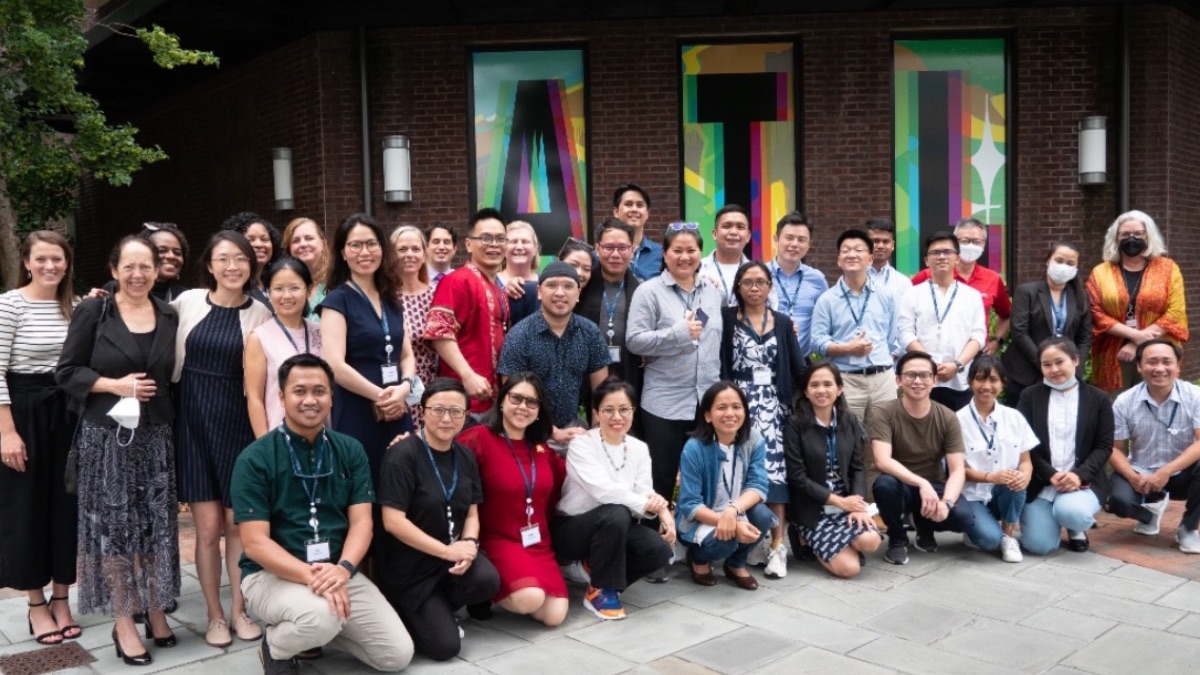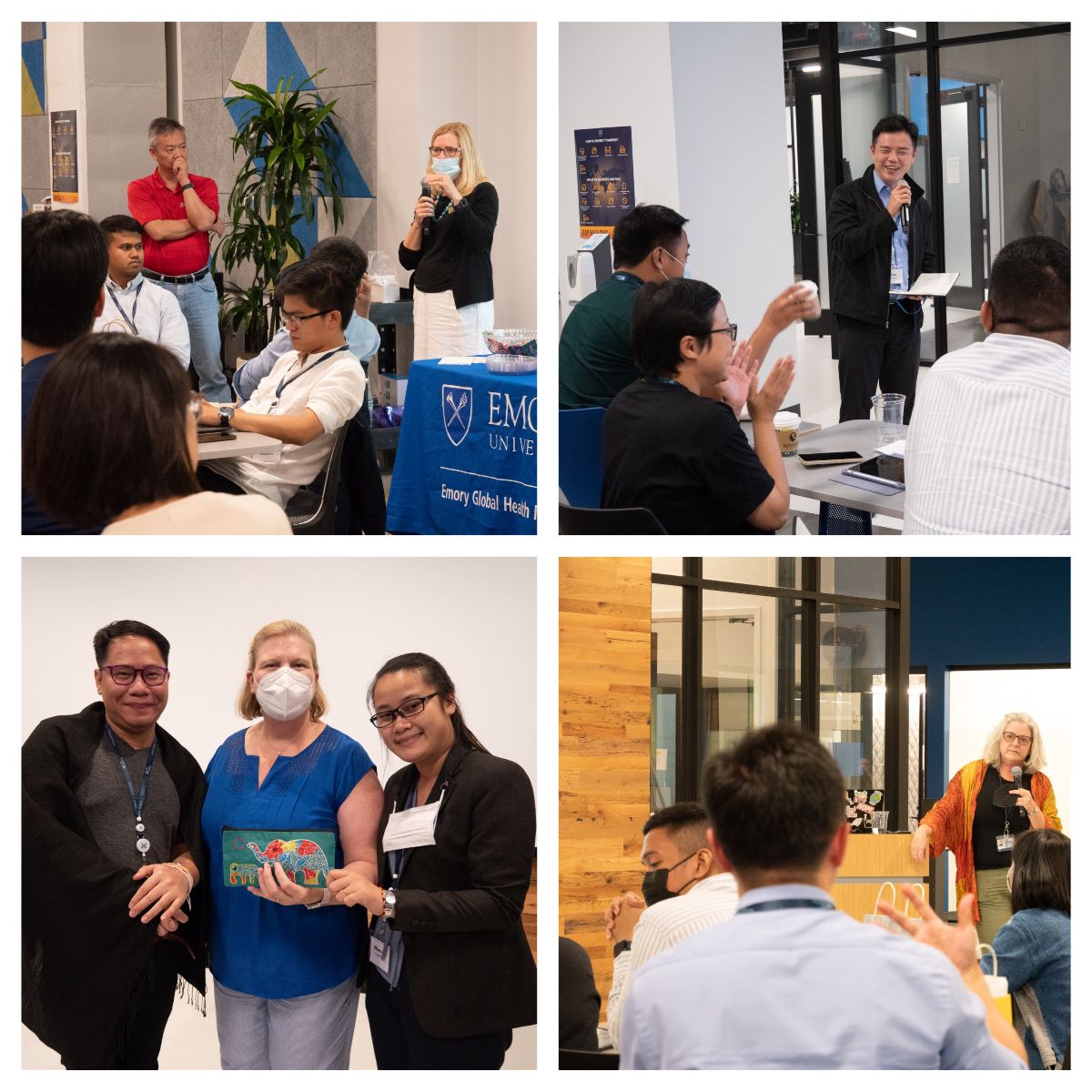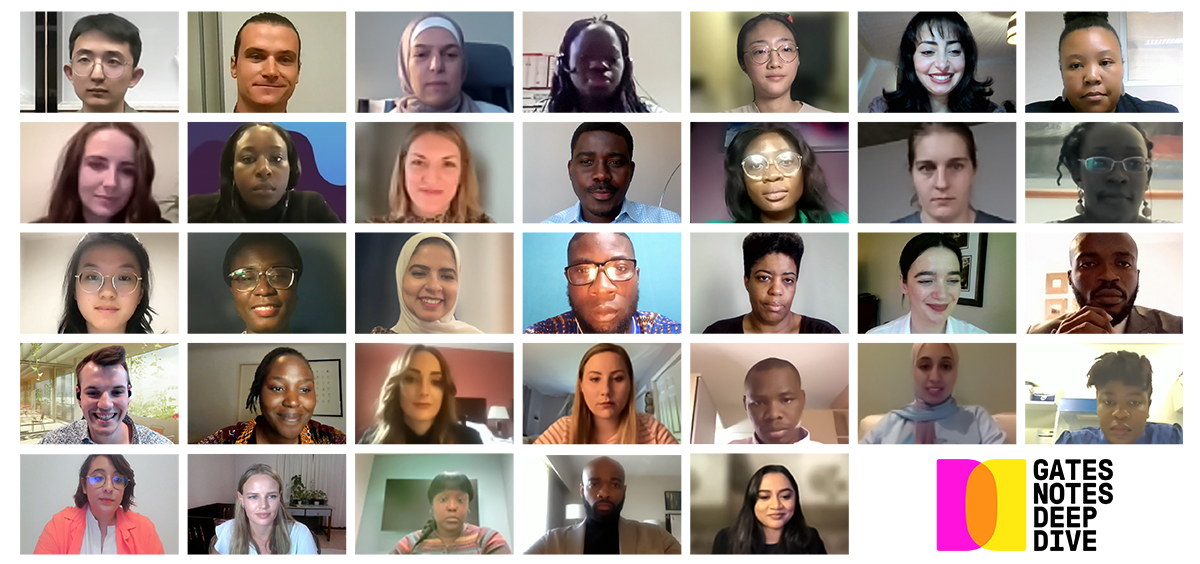Emory Global Health Connections - Summer 2022
IN THIS ISSUE:
- The Equity Initiative Fellows Visit
- EGHI Student Advisory Committee Members Talk with Bill Gates
- 2022 Global Health Institute Field Scholars Embark on Projects
- Q/A with EGHI Faculty Seed Grant Recipients
- 2021-2022 Decolonizing Global Health Series Wrap-Up
The Equity Initiative Fellows Visit

The Emory Global Health Institute hosted The Equity Initiative 2021 and 2022 Fellows, also known as the Atlantic Fellows for Health Equity in Southeast Asia (AFHESEA), in June for a discussion about racial justice and health equity in America.The 48 fellows are professionals from Southeast Asia and China who work in government, academia, NGOs, the arts, private business, and social enterprise.The annual fellowship program, which launched in 2016 with sponsorship by the China Medical Board and the Atlantic Philanthropies, aims to improve health equity, particularly among the most vulnerable and marginalized populations.In Atlanta, the group visited with leaders from EGHI to introduce the fellows to EGHI, its programs, and its priorities, including the work being done to enhance and build equitable partnerships. The fellows also learned about CHAMPS and IANPHI.

EGHI Student Advisory Committee Members Talk with Bill Gates

You’d forgive William McCollum, RSPH MPH 2022, for being a bit starstruck, given that he was one of only six students from a U.S. university selected to participate in a conversation with tech pioneer, philanthropist, and billionaire Bill Gates. McCollum was nominated alongside three other Emory students by Vice President for Global Health and EGHI Director Dr. Rebecca Martin for participation in the inaugural session of Gates Notes Deep Dive. This special series, launched by Gates Ventures, brings together diverse graduate students from around the world for a learning session and Q/A. Also selected for the event were Savannah Miller, RSPH MPH 2022; Ngozi Ugboh, RSPH MPH 2022; and Caitlin Plumb, RSPH MPH 2022. Miller, Plumb, and McCollum are current EGHI Student Advisory Committee Executive Board members. Ugboh is a current SAC member.At the April 22 virtual event, the Emory students spent almost three hours in a discussion and Q/A with Gates and subject-matter experts, talking about pandemic prevention—improving disease surveillance, building a global response team, strengthening health systems, and developing breakthrough tools like vaccines and therapeutics. “Being selected for this opportunity and getting to meet a pioneering business mogul who has inspired me and many others was a truly extraordinary experience,” McCollum said. “I recently authored a thesis on vaccine hesitancy, which I had just submitted the night before. He commended my original scholarship on this topic by saying, ‘It’s great that your thesis is looking at how we can do better with our narrative. That's really fantastic.’ I was thrilled to have written a thesis that made Bill Gates happy.” Plumb says she appreciated the opportunity to meet students from around the world, and that she learned a great deal from listening to Gates and other speakers discuss pandemic preparedness. “I gained new connections in my global health network and gained a deeper understanding of the issues,” she said. “I feel very lucky to have been selected for this opportunity.” In a blog post, Gates wrote about why he created the Gates Deep Dive. “One of the best parts of my job is getting to meet with smart people who are thinking about big problems … Future leaders like them make me optimistic that brighter days are ahead.” In another post, Gates wrote about the students who participated in the pandemic-prevention conversation. “I loved hearing their questions and talking with them about the next wave of innovations—and the role they can play in getting those innovations to everyone who needs them,” he wrote. “I’m inspired by the students themselves. It’s exciting to know that they—and thousands of other smart people like them—are committed to developing and deploying the innovations that will protect the world from future pandemics.”
Q/A with EGHI Faculty Seed Grant Recipients
Every year the EGHI Faculty Seed Grant program provides funding opportunities to Emory faculty members for interdisciplinary global health research or programmatic work.The funded project or research is expected to lead to improvements in individual or population health through sustainable and interdisciplinary partnership and exhibit principles of global health equity.Established in 2007, EGHI has provided more than 70 grants for what are typically 12- to 18-month project periods.Here, a Q/A with recipients of Faculty Seed Grants in 2022:Dr. Gonzalo Vazquez Prokopec, Winship Distinguished Associate Professor, Department of Environmental Sciences, Emory College of Arts and Sciences Q: Why did you apply?A: I am interested in establishing a new collaboration with a genomicist who works with Aedes aegypti mosquito genome sequencing, and establish a novel approach to study the response of mosquitoes to interventions by linking genomic data with spatial analysis. Q: For what do you intend to the use the funds? Please describe for me your project and how this grant is “seeding” future research, work, and impact.A: The team will capitalize on a bank of mosquitoes collected as part of a NIH-funded clinical trial and analyze data from those mosquitoes to understand their evolution in space and time to the application of insecticides. This seed grant will provide funds to build a new collaboration among Emory and University of Florida researchers to expand our team’s research on mosquito ecoepidemiology by studying the population connectivity of Ae. aegypti being impacted by targeted indoor residual spraying in the city of Merida, Mexico. We will generate essential genome data to understand the genetic relatedness of Ae. aegypti collected from multiple locations within a city and inform programs about the efficacy of their strategies. Q: Why are grants like this important?A: Currently, funding agencies and reviewers rely on the existence of preliminary data to evaluate the quality and feasibility of a proposed grant idea. Seed funds provide the essential building blocks for establishing and nurturing collaborations, and generating data and results or new hypotheses about global health threats. In my case, seed funding has provided an investment into future ideas and proposals, with a great return on the investment made by EGHI.Dr. Amy Zeidan, Assistant Professor of Emergency Medicine, Emory University School of Medicine; Adjunct Professor, Hubert Department of Global Health, Rollins School of Public Health; Co-Director of The Georgia Human Rights Clinic Q: Why did you apply?A: The EGHI supports so many incredible projects, and I've been impressed with the breadth and depth of their work and the projects they support. They have supported local-global work previously, specifically funding our work to explore unmet health needs for refugee, immigrant, and asylum-seeking populations in Georgia. Q: For what do you intend to the use the funds?A: These funds will be used to explore the extent of work-related injuries among immigrant populations seeking care at Grady Memorial Hospital. Results of this work will assist with development of a hospital-based injury-prevention toolkit for workers, focusing on workers’ rights and injury prevention. Importantly, this project is an interdisciplinary collaboration with faculty from emergency medicine, trauma surgery, and nursing, and in partnership with Sur Legal Collaborative, a worker's rights organization based out of Atlanta. Q: Why are grants like this important?A: Grants like this are incredibly important, as they allow researchers to explore critical topics and provide a foundation for larger funding sources. They are a perfect stepping stone to help investigators demonstrate competence as independent investigators and a precursor for success.
2022 Global Health Institute Field Scholars Embark on Projects
The 2022 Field Scholars embarked on their projects this summer.The Field Scholars are students from across Emory University who have proposed innovative global learning projects that involve a partnership with local organizations in the country where they seek to conduct field work.
A list of the 2022 Field Scholars' projects are shown above. Learn more about the people and their projects here.
2021-2022 Decolonizing Global Health Series Wrap-Up
The second-annual Decolonizing Global Health Series, sponsored by EGHI, focused on equitable partnerships—how they are created and help achieve sustainable, impactful outcomes.The discussions from the four-part, 2021-2022 series led to tangible actions to decolonize and reconstruct our own practices at Emory while offering insight and lessons applicable at other academic institutions working in global health. Learn more about the series, view videos of the conversations, and access resources, at this link.